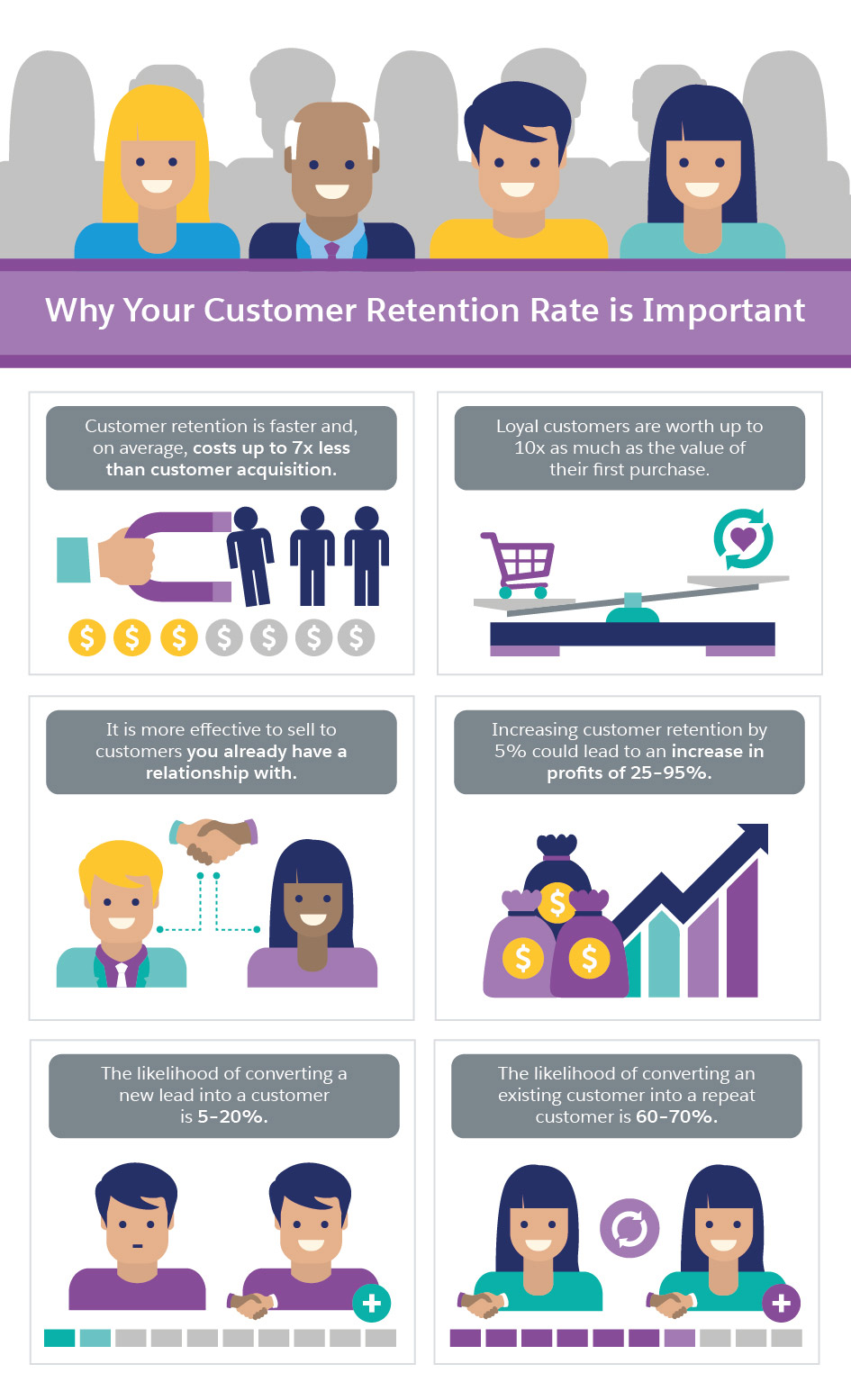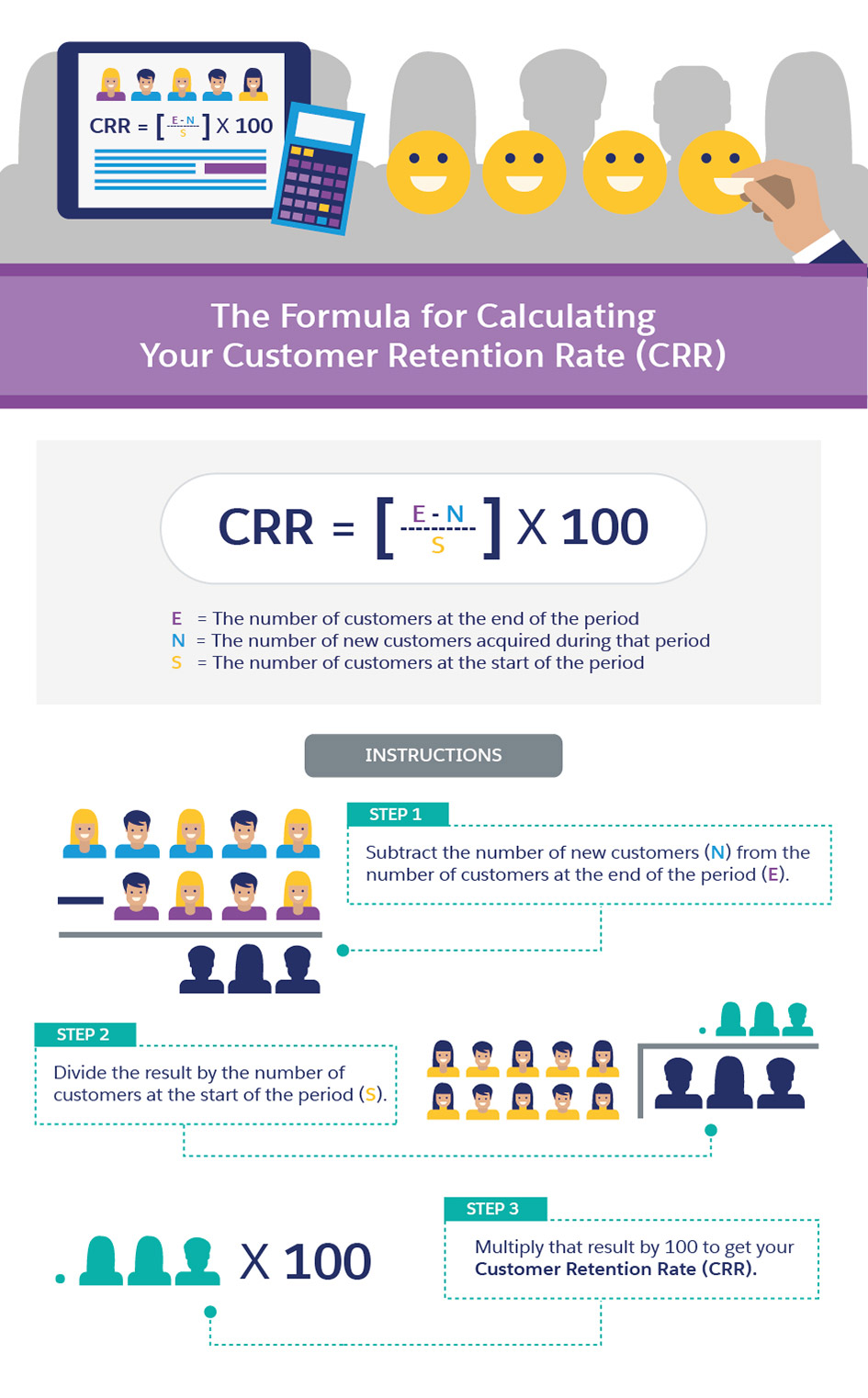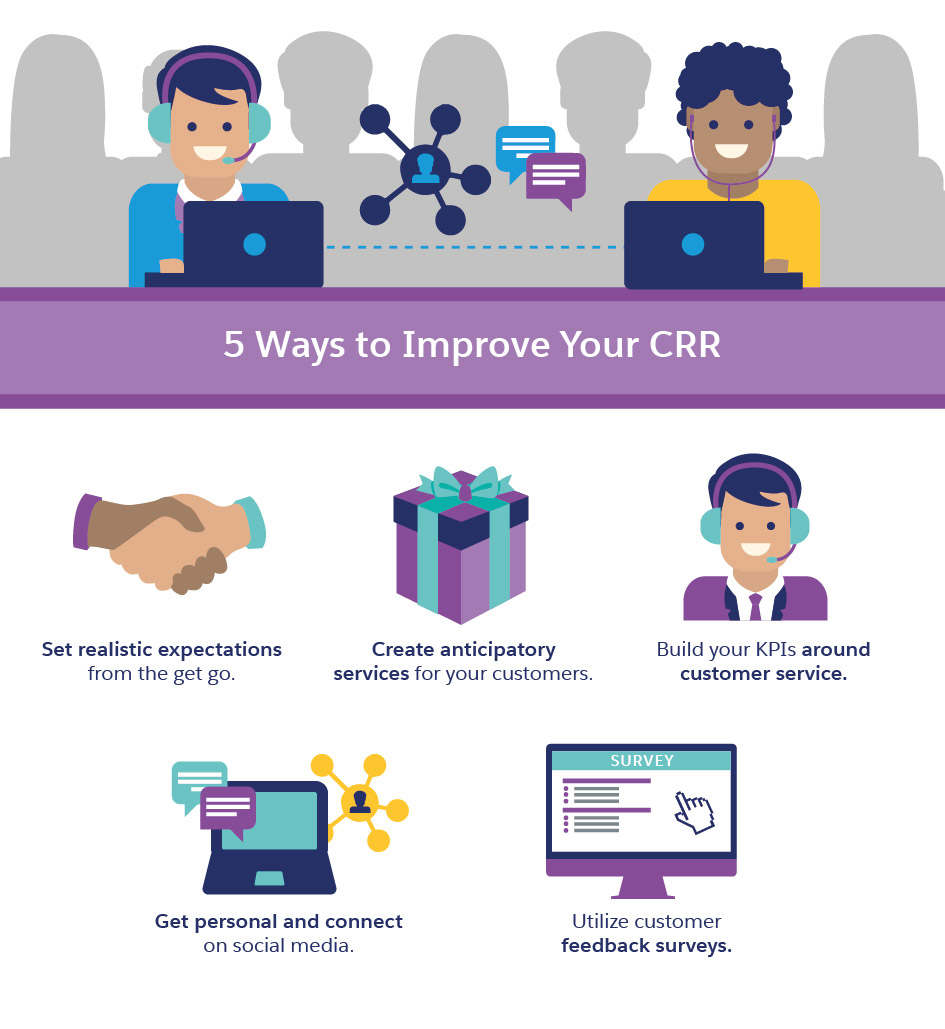Customer Retention Rate
How to Calculate and Improve Customer Retention Rate

What Is Customer Retention Rate and Why Does It Matter?

CRR is a figure that helps you understand how good your processes are in keeping customers happy and making them want to continue working with your company (retention). Customer retention begins with the very first impression and contact a person has with your company, and follows throughout the transaction and your company’s relationship with them. For example, a customer may begin this relationship when they “like” your Facebook page. That relationship won’t end unless they unlike your page, or other similar actions like not opening your email marketing campaigns, and removing themselves from your subscriber list.
So why is calculating your customer retention rate so important? Quantifying your success helps you put initiatives in place to keep your company strong, but there are a few facts to keep in mind:
According to NG Data, customer retention is faster and, on average, costs up to seven times less than customer acquisition. This is because selling to customers who you already have a relationship with is more effective. You don’t have to attract, educate, and convert them from scratch.
Invesp reported that increasing customer retention by 5 percent could lead to an increase in profits of 25 to 95 percent.
According to a Huify article, the likelihood of converting an existing customer into a repeat customer is 60 to 70 percent, as opposed to 5 to 20 percent for a new lead.
Upselling to existing customers is usually more lucrative than whatever sale you would make on a new client.
According to Client Heartbeat, loyal customers are worth up to 10 times as much as their first purchase.
As you can see, customer retention is one of the best ways to grow the revenue of your business. The moral of the story: You want loyal customers. How, then, do you improve your customer retention rate? Before you worry about improving your number, let’s talk about how to calculate it.
How to Calculate Customer Retention Rate
Below are a few metrics and how they are used to calculate CRR. This formula should work for any business regardless of size. It helps to break the calculation into parts.
The Goal
You are looking for the number of customers that remain at the end of a given period without counting the number of new customers that were acquired during that period.
Information You’ll Need
- The number of customers at the start of that period (S)
- The number of customers at the end of a period (E)
- The number of new customers acquired during that period (N)
The Formula for Calculation
CRR = ((E-N)/S) X 100

An Example
Let’s say you had 107 customers at the start of the one-month period you’re tracking (S). During that period, you lost 8 customers, but you gained 21 (N) new customers. This means that at the end of the period, you had 107 of your original customers, plus 13 new customers, so you now have 120 customers (E) at the end of the period. Input those numbers into the formula:
CRR = ((120-21)/107) X 100
CRR = 92.5%
This means that your retention rate for that period was 92.5 percent.
Benchmarking CRR (What You Should Aim For)
The most ideal rate is 100 percent; this would mean you didn’t lose a single customer. However, this isn’t a number you should expect to hit. You should aim for at least 85 percent for your business to remain scalable and strong. It seems high, but it’s actually a pretty average figure for small businesses.
5 Ways to Improve Your Customer Retention Rate
There are countless ways to help improve your retention rate, but if you really want to be successful, you have to be willing to truly evaluate your company, identify why some customers are leaving, and then put an actual customer retention plan in place. This plan will differ based on your company and the needs of your customers, but in almost all cases it will help to create a strategy and implement practices that can become a part of your routine. This makes improving your CRR specific to your business.
Here are some popular tips—applicable to all companies—to consider. These will set you on the right path.
Set realistic expectations from the get-go
You want to under-promise and over-deliver. This means that when you begin a relationship with a customer, make sure they know what they’re getting and what they can expect. You still need to capture a customer’s attention to close the sale, but don’t over-promise. Be as realistic as possible and then do your best to outperform what the customer is expecting. This helps create brand loyalty, and when customers feel they can trust you, it keeps them coming back. This also pushes your company to work with clear goals in mind and makes it easier to impress your customers.
Remember, too, that customers often recall negatives before positives, so avoid unpleasant experiences or unmet expectations. Even if you get it right nine times out of 10, that one mistake could be enough for a customer to leave.
Create anticipatory services for your customers
Have a system in place so you can let your customers know of an upcoming payment, event, or problem before it happens. This helps establish trust: Customers will know you’re on top of your business. By keeping them in the loop, they’re less likely to get any late charges or surprises. The most common way to do this for most companies is to alert a customer when an invoice is due, but there are other ways your company can get creative with anticipatory strategies.

Build your Keep Performance Indicators (KPIs) around customer service
One of the most obvious ways to improve your customer retention rate is to improve customer service. How you make improvements can be an overwhelming topic, but a great way to start is by setting up KPIs around customer service. KPIs help make sure your employees know that performance is measured objectively, and they allow you as an employer to offer incentives for a job well done. If you can align customer service KPIs with the goals of your customers, it can help improve your CRR.
Get personal and connect on social media
Connecting with your customers on social media takes your interaction to the next level. By connecting on social media, you can better show your personality and interact on a more personal level (not to mention earn more visibility). This is also a great place to establish trust between your company and a customer. When they know they can reach out to you online and they easily hear about deals or what is going on in your business, they’re more likely to stay engaged and loyal.
Utilize customer feedback surveys
Surveys can be used on your Thank You page, in an email marketing campaign, or even on social media. This is a great way to get feedback from your customers, and you need to use their comments and scores to make their customer experience better. Not only will making these changes help keep current customers satisfied, but it will also help you perfect your entire process for new and prospective clients.
Who Needs to Implement Customer Retention?
Everyone! As discussed above, calculating your customer retention rate, then creating a CRR improvement program is crucial for any company. You want to make sure you have brand loyalty with your customers. Although it’s a lot of work and may take time to see quantifiable results, statistics show that it will pay off in the long run. Truly, there is not one type of company that would not benefit from understanding and improving CRR. Even blogs that don’t sell anything should aim to keep their “customers,” usually known as readers, loyal and coming back for more. With the formula, calculate your CRR, make a plan to improve it, and use the tips in this article to keep your customers loyal.


